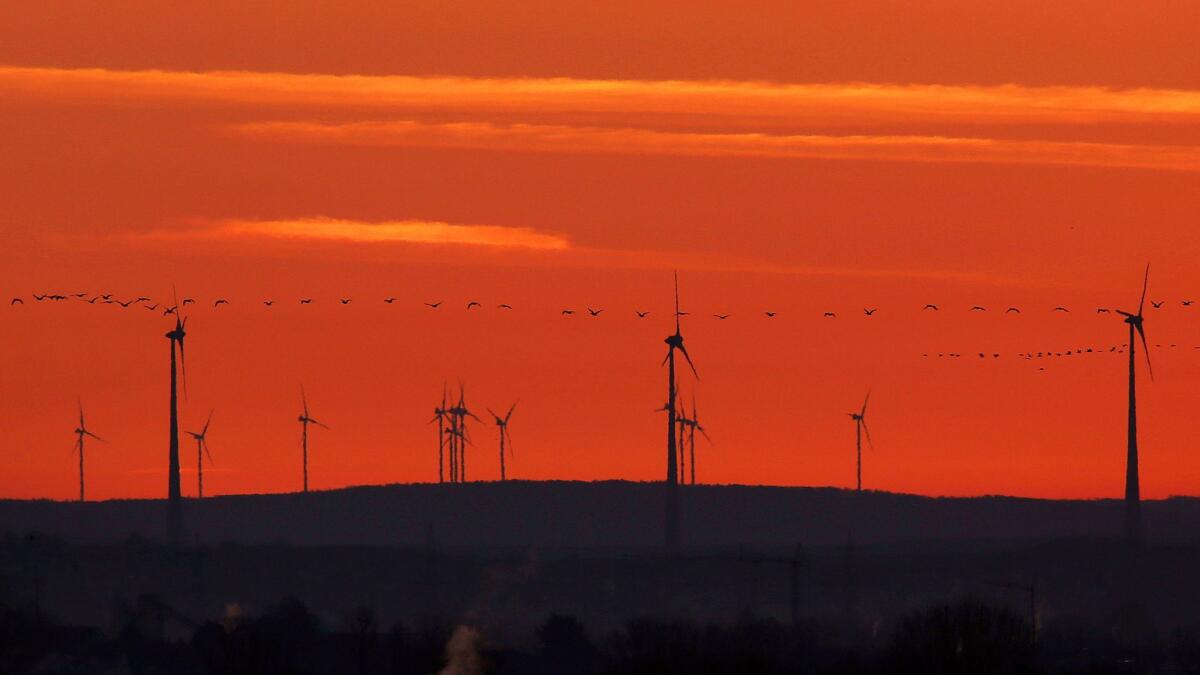Editorial: If Trump withdraws from the Paris agreement, let’s hope the world survives

- Share via
This is one campaign promise that President Trump should have let slide. According to news reports, Trump is on the verge of announcing that yes, he will withdraw the United States from the 2015 Paris climate agreement among nearly 200 nations. If that comes to pass, the move will just make it more difficult for the world to counter the worst effects of the global warming that’s already underway. The more level-headed and reality-based members of Trump’s inner circle need to redouble their efforts now to turn their boss around.
Granted, it won’t be much of a surprise if Trump reneges on the accord. As a candidate, he assailed the non-binding pact as a “bad deal” for the U.S. Nevertheless, White House aides had said before Trump left for his recent nine-day foreign trip that he was keeping an open mind. That fueled hope that Trump might recognize the folly in rejecting the overwhelming consensus of climate scientists that human activity is dangerously increasing global temperatures.
If the latest reports are true, though, he must not have listened to what every other leader at the G-7 summit in Sicily was saying. The withdrawal would also send a troubling signal that the nationalists on his team have won out over the realists, which means the administration is becoming more inwardly focused as the world is growing more globally connected.
Trump thinks he knows better than the scientists or the energy sector. He has no expertise in either
Trump already has been pursuing policies aimed at expanding U.S. production of fossil fuels to achieve what he called “American energy dominance,” rather than mere “energy independence.” He proposed slashing the Environmental Protection Agency’s budget by 31% (the enforcement section alone would be cut by 40%), appointed climate skeptic Scott Pruitt to dismantle — er, run — the agency, and has taken steps to end President Obama’s Clean Power Plan, a framework for compelling states to effect significant cuts in greenhouse gas emissions from power plants. These steps will make it harder to meet the commitment Obama made in Paris to reduce U.S. carbon output 26% to 28% below 2005 levels by 2025. Trump also wants deep cuts in climate-change research, and would slash the Office of Energy Efficiency and Renewable Energy by 69% — a move that critics say would hamstring government investment in renewable energy research.
How Trump intends to ride fossil fuel production into dominance of an energy sector increasingly shifting to renewables is perplexing. Oil companies themselves are planning for the day when global oil consumption begins to ebb and becomes supplanted by less-harmful natural gas — an already profitable portion of their overall business. But they’re also expanding their portfolios to include renewable energy sources. It’s telling that CEOs of Shell, Chevron, ExxonMobil and BP all urged Trump to keep the U.S. in the accord. New ExxonMobil CEO Darren Woods recently wrote that “we’re encouraged that the pledges made at last year’s Paris Accord create an effective framework for all countries to address rising emissions; in fact, our company forecasts carbon reductions consistent with the results of the Paris accord commitments.”
But Trump thinks he knows better than the scientists or the energy sector. He has no expertise in either, and has exhibited little curiosity about the interconnections between carbon emissions and global temperatures. Remember, his business background is in real estate, television shows and branded products. He has no science background, yet hubristically clings to his disbelief that human activity is pressing global temperatures higher — he infamously has referred to climate change as a hoax concocted by the Chinese to undercut U.S. manufacturing.
The irony here is that by backing out of the Paris agreement, Trump would cede international climate leadership and most of the benefits of a transitioning energy sector to the Chinese, which, along with India, is making surprisingly strong gains in reducing emissions. It’s remarkable that a president who has put so much emphasis on creating jobs is so willing to let other nations reap the financial gains from leading the world to a better, cleaner energy future.
Trump’s position also flies in the face of public sentiment – 71% of Americans believe the science, and 59% say that protecting the environment is more important than protecting jobs. The frustrating part of this is that even Obama’s goals were insufficient if the world is to avoid the worst repercussions of global warming. The polar ice sheets are already shrinking, glaciers are melting, ocean levels are rising, storms have intensified, and droughts and downpours have become stronger and more erratic as species become stressed and trees that once thrived in places like the Sierra Nevada die by the millions. The world needs to go in one direction, and Trump wants to point the United States the wrong way. Strong science-influenced and clear-eyed leadership — both nationally and internationally — are required if we’re to keep the worst of it from happening. And in Trump, we don’t have that.
Follow the Opinion section on Twitter @latimesopinion or Facebook
More to Read
A cure for the common opinion
Get thought-provoking perspectives with our weekly newsletter.
You may occasionally receive promotional content from the Los Angeles Times.






